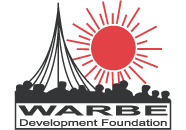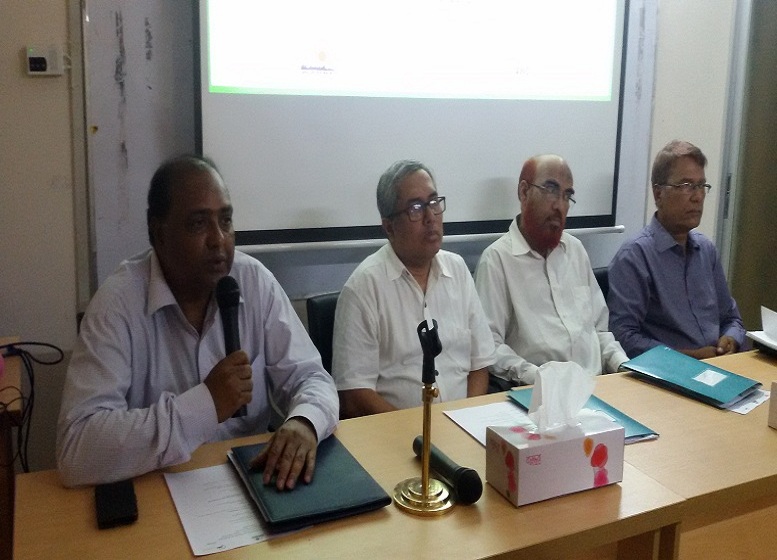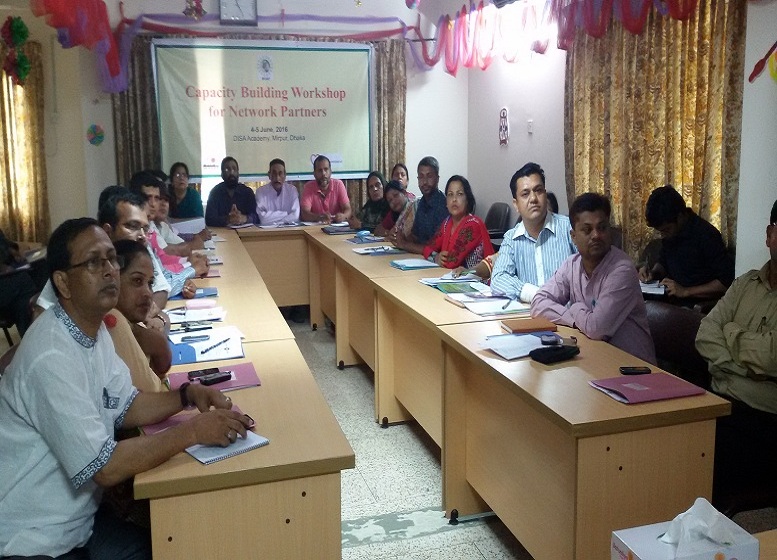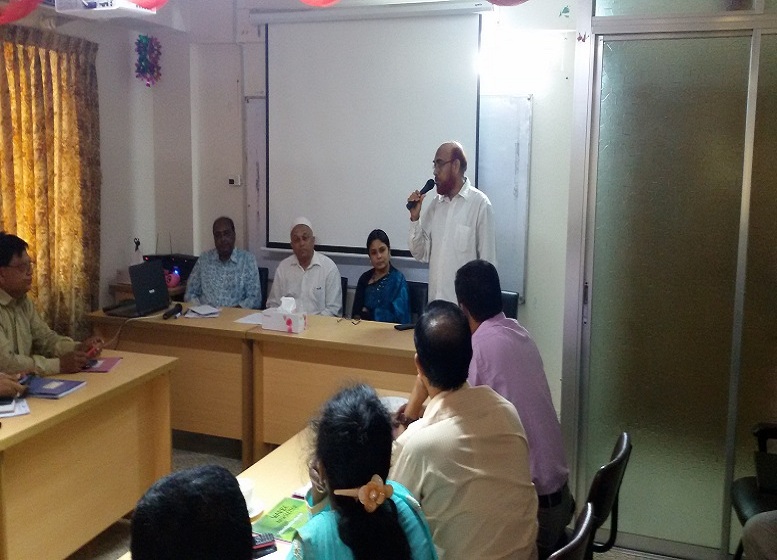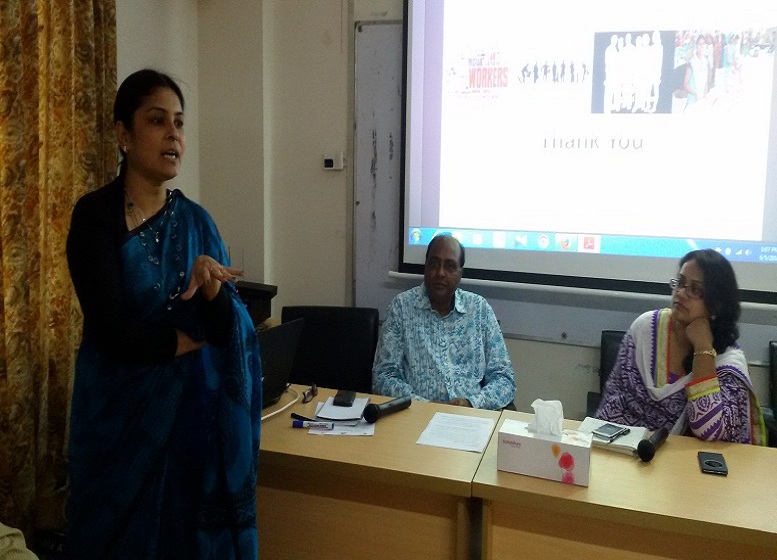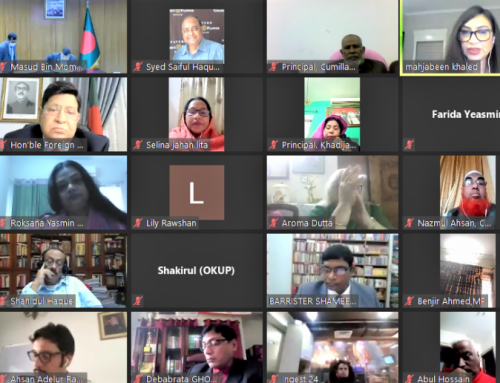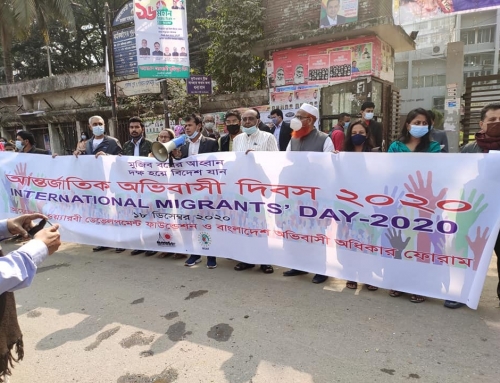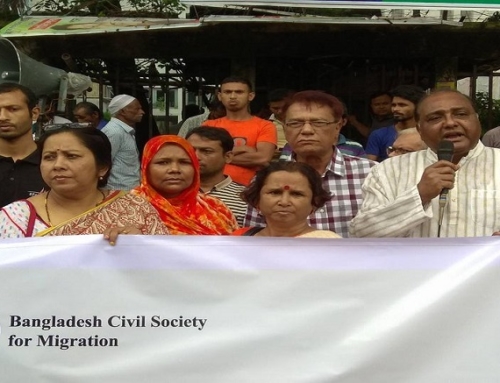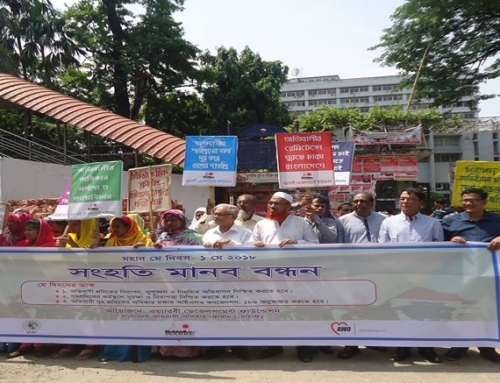Capacity Building Workshop on Networks Partners
A two days long workshop on “Capacity Building Workshop for Network Partners” organized by Bangladesh Ovibashi Adhikar Forum (BOAF) and Supported by WARBE Development Foundation and AWO International held at DISA Academy, Mirpur, Dhaka, Bangladesh on 4-5 June 2016. The key objectives behind organizing this capacity building workshop were- to strengthen the network on the issues of migration, migrants rights, and development, to ensure a basic understanding among the participants on the key focuses of Sustainable Development Goals (SDGs) and Global Forum on Migration and Development (GFMD), to chalk out a plan of action for the division & district level networks focusing Sustainable Development Goals (SDGs) & Global Forum on Migration and Development (GFMD) in 2016. Network members of BOAF from different districts participated in this workshop.
On 4 June, 2016 the workshop began with the welcome speech of Md. Faruque Ahmed, Secretary General, Bangladesh Ovibashi Adhikar Forum (BOAF). He spoke about the dignity of female migrant workers; especially in Saudi Arabia they are really in distressed condition. He said, our government should emphasize on the dignity of the female migrant workers in destination country but unfortunately they are not doing that. So we want to raise a collective voice. BOAF looks up to expanding its activities in 8 divisions in an unified and uniformed manner to help the victims. He discussed on the likely outcome of the participants out of attending this workshop.
Nazmul Ahsan, President, Bangladesh Ovibashi Adhikar Forum (BOAF) thanked the audience for coming all the way, and WARBE DF for supporting for this program. He also thanks OKUP, and BOMSA for the inspiration in building such a forum for the migrant workers. He says, BOAF wants to build their forum in 8 divisions, through which a migrant worker, living at the rural area and having least idea and information regarding safe migration will be benefited from. He also requested everyone to share their experience if they had experienced any problems.
Syed Saiful Haque, Chairman, WARBE DF, welcomed the participants for coming all the way and attending this workshop. He basically discussed on the background of GFMD. He said the idea of GFMD came out from the UN’s High Level Dialogue in 2006. A large number of UN foreign delegates expressed their interest in continuing the dialogue on migration and development. The GFMD’s strong link with the United Nations is maintained through the Special Representative of the Secretary General on International Migration and Development. However, GFMD is an informal, voluntary global forum. The 1st GFMD took place in Belgium in July 2007. After Belgium, it was held in the Philippines. The host government has the responsibility for the preparation process and the implementation of forum. First 2 days are allocated for Civil Society’s discussion, next day for common space & last 2 days for government discussion. PGA also provides the essential space to allow civil society to connect the governments’ in GFMD process. The next GFMD will take place in Germany, 2017.
Abdullah Al Mamun, Program Manager, OKUP, in his speech spoke on the idea on migration context in Bangladesh. He started his discussion with some statistics about the migrant workers. He also mentioned that 80% of total migrant workers are interested to go to Middle East, Malaysia & Singapore but our government does not have any proper record of the number of their return and death. Day by day they are contributing to our economy by sending their valuable remittance.
He divided the whole participants into 3 groups for a workshop. Group-1 has to identify the pre departure problems; group-2 has to identify their problem in destination countries & group-3 has to the problems when they return.
Group-1:
- Financial Problems.
- Lack of information regarding the types of works.
- Wrong information of the destination country.
- Language problems.
- Lack of skill.
- No info from the relevant organization.
Every year 13-15 lac are entering in the job market, one third of them are the age of (1-22 years). We have a law on the rights of their information, but they do not know about that. So we should aware them by spreading the information.
Group-2:
- Accommodation,
- Salary,
- Health,
- No support from Embassy,
- Torture by owner,
- Kafala System,
Our migrant workers still don’t get any help from the Embassy in the destination country. They also don’t have enough staffs for guiding them.
Group-3:
- Different disease.
- Mental sickness.
- Don’t have enough loans to start a business.
- Lack of safety.
- No social respect.
Kazi Abul Kalam (Joint Secretary, Member, NCTBB)
He spoke on the context of Migration issues in Bangladesh. He started his discussion with the migration trend of our workers. In Qatar we have 91%migration workers of the total population. Like UAE (88%), Kuwait (72%) the number of migrant workers is almost high then the total population. On his presentation he also discussed the Expatriates’ Welfare act-2013. He gave a brief idea on 3rd & 7th chapter of the act. After that he also spoke on Expatriates’ Welfare act-2016. Under the act he discussed the objectives & challenges of the new act. Finally he told that BOAF can involve in National Labor Rights Forum & also share their Experience with them. If we solve these problems then our migrant’s workers can take their legal steps.
At the end of the presentation of Kazi Abul Kalam, Syed Saiful Haque also told that we should respect 3 categories of people. 1. Freedom Fighter 2. Farmers 3.Migrant Workers.
Jasiya Khatoon (Director, WARBE DF)
She had a presentation on Social structure and networking strategy. At first she told about the contribution of the migrant workers, but unfortunately they don’t get proper judgment of their work. At first we should build a strong network between individuals & organization like BOAF. It keeps maintaining by the hard work of WARBE which starts from the grass root levels. As a result we built MISC for spreading the info to every migrant worker. Another social structure CBO, is also working to create awareness. She also discussed the activities of MAC & DMRN. Finally she said that an organization cannot do everything but a forum can raise their voice in any time.
After her session, Syed saiful Haque also told everyone to make a slogan or tag line for BOAF. As a member of BOAF we should know all information of BOAF so that we can share it with others. He invited Mr. Nayan to discuss on Bangladesh Labor Law.
Mr. Nahidul Hasan Nayan (Director Operation, AWAJ Foundation)
At first he gave greetings everyone from his foundation. He said that they are working for protecting the rights of the labor law. On his total presentation he elaborately discussed the labor law including work hour, salary, leave, procedures for leaving a job, retirement and other related issues.
Mr. Shameem Ahmed Chowdhury Noman(Member, BAIRA)
He was talking about the overseas recruitment of BAIRA and other relative issues. In private sector, BAIRA has 1250 license although 900 of them are active. He also talked about the discrimination of our migrant worker because the migrant workers of Philippine, India is getting more salary than our workers. The main reason of the discrimination is their skill. Our workers are also taking wrong initiatives because of the scarcity of the information. They are spending 70- 80 thousand taka for their visa. So we have to train up to our workers about self defense. We think we are so far from the system. Embassy also needs to be strong. If we well equipped them then 80% of the problem will be solved.
Day-2
In day 2, the session began with the recap of the previous day’s learning, took part in group work for developing action plan, which was conducted by Aminul Islam. Every participant was divided into 3 groups with different topics. After the group work, the group coordinator gave a short presentation on that topic. The session mainly focused on getting a better grasp on how the participants know and understand the different issues.
Group-3: Social Structure
To achieve the goal we want to build a committee with a strong network which is inter connected with others. We want to expand our committee in national level, district level & divisional level. We can able to share information in grass root level.
Group Members: Civil society members from different organization.
Group-2: GFMD
Saiful Haque gave a brief idea on GFMD after the discussion of the group coordinator.
Syed Saiful Haque:
The idea of GFMD came out from the UN’s High Level Dialogue in 2006. A large number of UN foreign delegates expressed their interest in continuing the dialogue on migration and development. The GFMD’s strong link with the United Nations is maintained through the Special Representative of the Secretary General on International Migration and Development. However, GFMD is an informal, voluntary global forum. The 1st GFMD took place Belgium in July 2007. After Belgium, it was held in the Philippines. The host government has the responsibility for the preparation process and the implementation of forum. First 2 days are allocated for Civil Society’s discussion, next day for common space & last 2 days for government discussion. PGA also provides the essential space to allow civil society to connect the governments’ in GFMD process. The next GFMD will take place in Germany, 2017.
Ms. Rahnuma Salam Khan, Deputy Chief, MoEWOE
Sustainable Development Agenda agreed by 193 countries with 17 sustainable development goals through 169 targets. MDG was for just development countries where SGG is for all. It is also known as 2030 goal. She briefly discussed all goals but emphasized on Goal-8, which is decent work for all. Targets 8.8 describe the protection of labor rights and promote safe migration and secure work environment. Target 10.7 describes to reduce inequality. Transaction cost for sending migrant remittance should also be reduced by 3 percent. She also told in target 17.18 that, international organization could be partner like, ILO, IOM for sustainable development. At the end, she gave a brief plan for financing SDG.
Mr. Narayan Chandra Barma, Joint Secretary, MoEWOE
At first he said that his ministry is working to employ the unemployed persons overseas. Ministry could not able to capture the plights of migrant workers in rural area. If the forum disburses the news to the marginal people then our ministry could able to fix their problems. Safe migration is not possible to achieve by individual ones, for ensuring it we need help from the forum. We should take care of them because government has the highest income for them.
Mr. Shahidul Islam, Additional Director General, BMET
At first he appreciated everyone for their presence in the workshop. He also expects Go & NGO will work together in hand to ensure the betterment of the people. Especially he has lots of experience to work with NGO. The main circumstance of our worker in rural areas is very poor. They even don’t know the accurate information for migration. So it’s our duty to spread the information to them and ensure their safe migration.
Question from participants:
- Is there any plan of BMET to construct a Demo office in Brahmanbaria?
- Migration transaction should be E-Banking for the safety of their money. So is there any plan of our ministry regarding this issue?
Mr. Jabed Ahmed, Additional Secretary, MoEWOE
He gave the closing remarks of the 2 days workshop. He also told that ministry has strong linkup at the grass root level. Also there is scope to strengthen the existing relationship through the forum. At first he said that we should set a desire for reaching our final destination. Although our government gets the highest income from the sector, we have some failure in this sector. We could not able to reduce the migration cost, enough TTC for the migration workers. Finally our government has success in the sector besides some failures. So we hope we can overcome these obstacles in our next GFMD.





